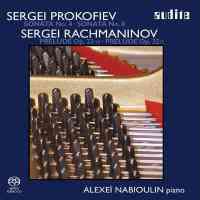Περιγραφή
Καλλιτέχνες
|
With this unusual recording of Russian piano music, audite presents its second SACD-Surroundsound production. Prokofiev’s Piano Sonata No. 8 was composed during a difficult phase in the composer’s life. Following eighteen years in exile in the West, he returned from Paris to Moscow in 1936. At first he was able to maintain his western-influenced lifestyle, but then, more and more, he saw his privileges melt away. His changed personal situation is also reflected in the Eighth Sonata, which establishes a considerably more lyrical and resigned tone than the rebellious Seventh Sonata. But the “muscular” Prokofiev is not neglected here either! Prokofiev’s Piano Sonata No. 4 was already composed in 1917 and as a reaction to the suicide of the composer’s friend, Max Schmidthof, to whom the work is also dedicated. Wandering harmonies and richly ornamented themes are combined in this sonata almost to the point of seeming improvisatory. A fiery final Rondo concludes the work, but its core is the Andante assai in which a critic even discovered something “related to Chopin” after the premiere. Rachmaninov’s Préludes were composed in two phases: first the 10 Préludes, Op. 23, then the 13 Préludes, Op. 32 about seven years later, to which Rachmaninov then added the early C-sharp minor Prélude, Op. 3 No. 2, thus attaining the number of 24 Préludes after the model of Bach. On this recording you can hear one Prélude from each phase. The G-flat major Prélude from Op. 23 clearly shows that all Baroque-like effects have disappeared and that Rachmaninov replaces such effects with the romantic expressive world and piano technique of the late nineteenth century. In the E major Prélude from Op. 32 one can experience the composer’s gripping motoric style; this represents a branching-out in his concert repertoire which was highly effective with the public. We were fortunate to have Alexeï Nabioulin, one of the most interesting up-and-coming pianists of our time, to perform on this recording. He achieved his international breakthrough by winning First Prize at the International Piano Competition in Dublin in 2000 and Second Prize at the Tchaikovsky International Competition in Moscow in 2002. Since then he has been in great demand as a concert artist throughout the world. Alexeï Nabioulin’s interpretations of the works recorded here reveal a very personal and highly interesting approach to the composers’ sound world. That is what makes this recording a true voyage of discovery in the world of Russian piano music. |









